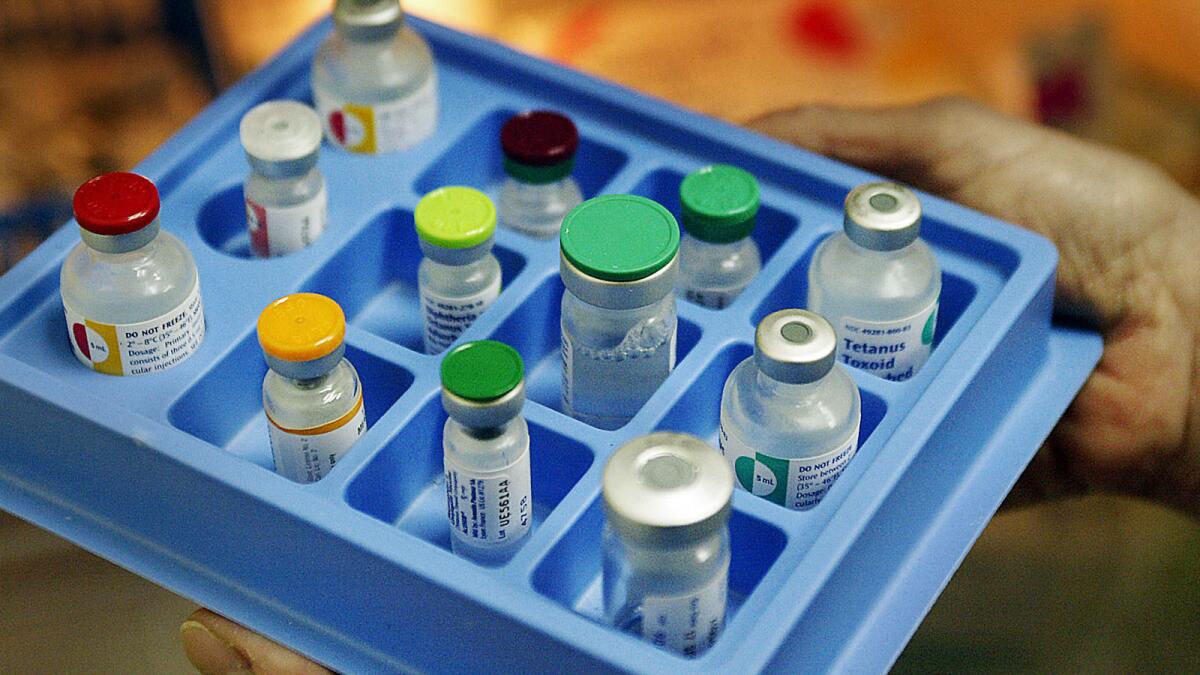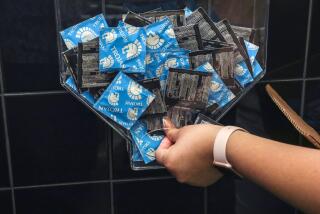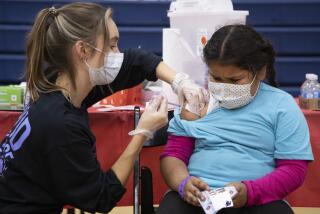Op-Ed: Why all 50 states need to allow teens to get vaccinated without parental consent

Long before Americans began clamoring for a novel coronavirus vaccine, a collection of teenagers across the nation was embarking on a quest for vaccination — by posing questions on Reddit. Teenagers with “anti-vax” parents were, and still are, desperately trying to figure out how to get vaccinated, but outdated laws in many states deny them agency.
As doctors, public health officials and regular citizens push for increased immunization, teenagers can and should have a role to play. They want autonomy — not simply to protect their personal well-being but to help end preventable diseases for everyone.
All 50 states need to give teenagers the right to be vaccinated without parental permission.
When I was 16, I stumbled upon my peers’ Reddit posts. I was stunned by the fact they were asking these questions and by how difficult it was to find clear answers. After a year of research, I launched VaxTeen, an organization that helps teenagers make informed decisions about vaccines and provides simplified state-by-state guides on vaccine consent laws.
In the U.S., the ability of minors to consent to vaccinations depends on the state they live in. The patchwork of overlapping judicial decisions, state codes, federal laws and accepted practices that govern the age at which children can consent — and what vaccinations they can consent to, if any — is convoluted, inconsistent and at times deliberately obtuse. Since vaccines often aren’t even explicitly mentioned, deciphering whether a minor is allowed to self-consent is extraordinarily complex, especially for teenagers trying to do so without their parents’ support.
Only seven states allow minors above varying minimum ages to make all of their own healthcare decisions, including those concerning vaccines. Delaware and Montana allow them to self-consent to all recommended vaccinations, although in Montana this doesn’t extend to the HPV vaccine. Six states, including California, permit them to consent to HPV and/or hepatitis B vaccinations, and six states apply a subjective “mature minor” exception that allows minors to self-consent to vaccination if a healthcare professional determines they are sufficiently mature.
In response to measles outbreaks among under-vaccinated communities in 31 states last year, the Illinois and New York legislatures are considering bills that would broaden a minor’s ability to self-consent to vaccinations from only those preventing sexually transmitted diseases to all vaccines that are CDC-recommended. Similar bills are being deliberated in Georgia and Washington, D.C., where minor vaccine-consent is not allowed.
There is a growing number of “vaccine hesitant” Americans who have not previously identified with the anti-vaxxer movement. Polls show that as the coronavirus pandemic has continued, citizens have become less confident about the safety of a vaccine.
Parents who are increasingly opting not to vaccinate their children have endangered everyone as immunization rates have fallen too low to keep diseases like measles and whooping cough at bay. In the school year preceding the COVID-19 pandemic, the rate of childhood vaccine exemptions claimed by parents rose in 40 of 49 states with recorded data. Requiring parental consent also poses a barrier to immunization for older teens whose parents are pro-vaccination since many of them attend routine checkups alone.
Dr. Arthur Caplan, founding director of the Division of Medical Ethics at New York University Langone Medical Center, told me “a mature minor” ought to be able to obtain — without parental consent — a “proven, safe intervention” that can prevent death or disability. “Parents should not have the authority to subject their children to serious preventable harm,” he said.
The American Medical Assn. and the Society for Adolescent Health and Medicine, among other medical organizations, strongly support laws permitting older minors to self-consent to vaccinations. Granting teenagers this right is essential to stemming the spread of diseases, whether they are newly emerging like COVID-19 or have faded from the news. For example, although measles was declared eliminated from the U.S. in 2000, last year the country had the highest number of cases since 1992.
Overall, more than 42,000 Americans die each year from diseases preventable by vaccination. Over the course of the pandemic, the U.S. has experienced a dramatic drop in already falling childhood vaccination rates, driven by fears of being exposed to the virus in doctors’ offices and stoked by the growing prevalence of vaccine misinformation online. Minors must be allowed to self-consent to existing vaccinations — and to an adolescent COVID-19 vaccine once it is available.
Young people across the country are advocating for their medical rights to protect themselves and their communities. I am fortunate enough to have pro-vaccine parents, so I can only imagine the courage it takes to question your parents’ misguided beliefs. States should empower teenagers to act.
COVID-19 has served as a startling public health lesson: We each have a responsibility to prevent the transmission of disease — whether through vaccination or social distancing — to ensure our collective health. Encouraging our state legislatures to enact straightforward vaccine consent legislation for minors would help accomplish that.
Kelly Danielpour is a senior at Crossroads School in Santa Monica and founder of the organization VaxTeen.
More to Read
A cure for the common opinion
Get thought-provoking perspectives with our weekly newsletter.
You may occasionally receive promotional content from the Los Angeles Times.










